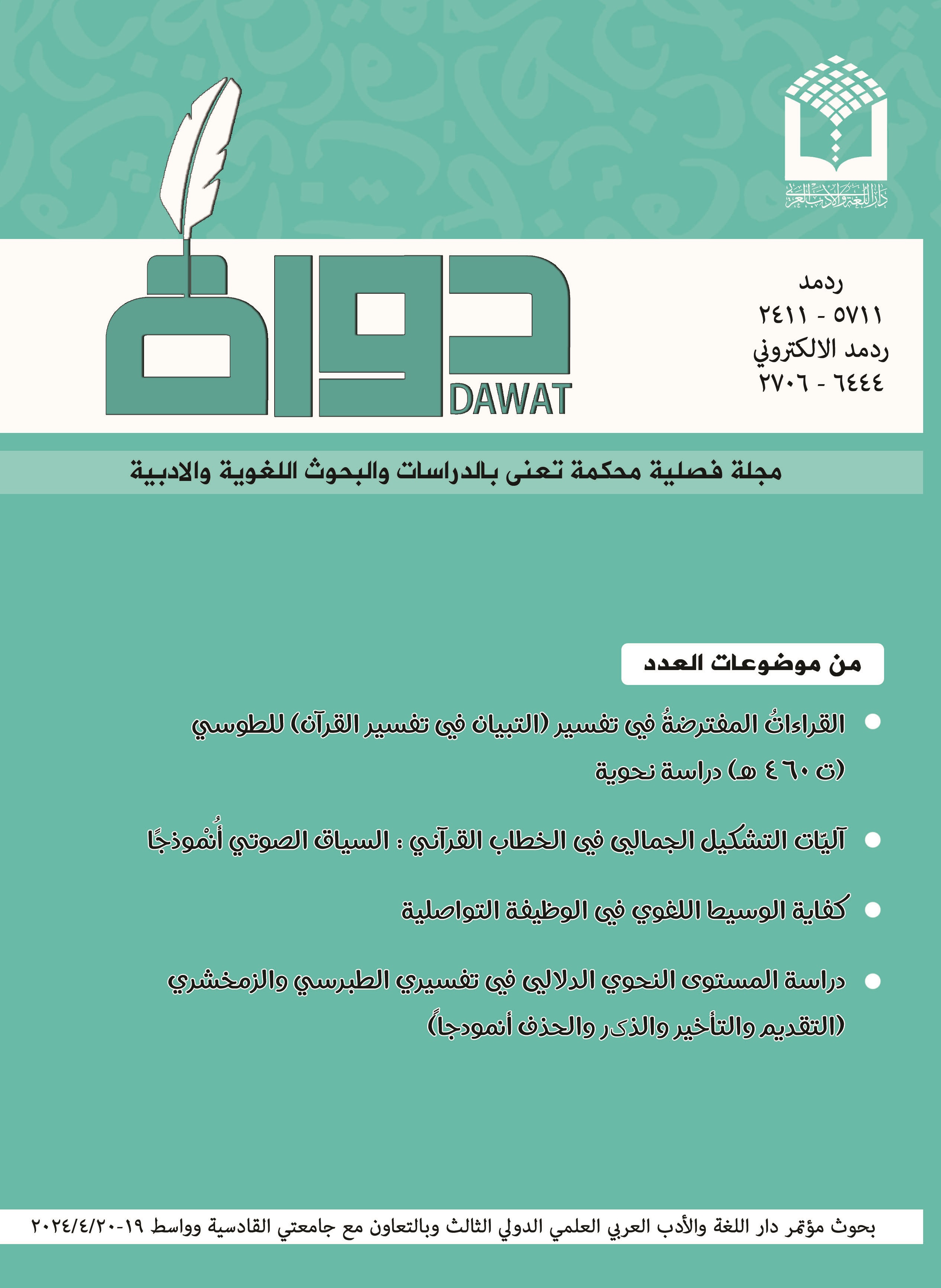Abstract
The significance of this research stems from the necessity to clarify the means by which God Almighty preserved His last book revealed to the Seal of the Prophets (PBUH) from additions and deletions. Unlike His two books, the Torah and the Bible revealed to Moses and Jesus (PBUH), they were distorted. Thus the Holy Quran would remain a pure revelation with supreme authority over other heavenly books.
It is required to divide this research required into an introduction and a preface in which the concepts of criticism are explained. Followed by two chapters, the first is devoted to studying the means of preserving the Quran from distortion, and the second is to studying the distortion of the Torah and the Bible.
It is concluded that God Almighty pledged to preserve His final book. The Prophet (PBUH) and the companions are inspired to write it down for fear of differences in its oral circulation. Then God appointed the companions to unify its readings, and a group of scholars are appointed to preserve the meanings of the Qur’an to confront interpretations that distort the meanings. In contrast, God did not pledge to preserve His books, the Torah and the Gospel; hence, they remained unwritten for a long time. Consequently, oral circulation tampered with them according to the whims of the Jewish rabbis and Christian monks, until myths, superstitions and pagan beliefs crept into them. Therefore, they became repulsive in the modern era.
It is required to divide this research required into an introduction and a preface in which the concepts of criticism are explained. Followed by two chapters, the first is devoted to studying the means of preserving the Quran from distortion, and the second is to studying the distortion of the Torah and the Bible.
It is concluded that God Almighty pledged to preserve His final book. The Prophet (PBUH) and the companions are inspired to write it down for fear of differences in its oral circulation. Then God appointed the companions to unify its readings, and a group of scholars are appointed to preserve the meanings of the Qur’an to confront interpretations that distort the meanings. In contrast, God did not pledge to preserve His books, the Torah and the Gospel; hence, they remained unwritten for a long time. Consequently, oral circulation tampered with them according to the whims of the Jewish rabbis and Christian monks, until myths, superstitions and pagan beliefs crept into them. Therefore, they became repulsive in the modern era.
Abstract
ترجع أهمية هذا البحث إلى بيان وسائل حفظ الله تعالى لكتابه الأخير المُنزل على خاتم النبيين(ص) من الزيادة والنقصان، بخلاف كتابيه التوراة والإنجيل المُنزلين على موسى وعيسى(ع) الذين حُرِّفا، ليبقى الكتابُ العزيزُ وحياً نقياً ذا سلطةٍ عليا على غيره من الكتب السماوية.
واقتضت طبيعة البحث أنْ يُقسَّم على مقدِّمة وتمهيد بيّنتُ فيه مفاهيم النقد، يليه مبحثان، خُصص الأول لدراسة وسائل حفظ القرآن من التحريف، وخُصص الثاني لدراسة تحريف التوراة والإنجيل.
وتوصل البحث إلى أنّ الله تعالى تعهد بحفظ كتابه الأخير، ما أوحى إلى النبي(ص) والصحابة بأمر تدوينه خشية الاختلاف في تداوله شفاها، ثمّ قيّض الله الصحابة أن يُوحِّدوا قراءاته، ثمّ قيّض الله لحفظ معاني القرآن فريقا من العلماء للتصدّي للتأويلات التي تُحرِّف المعاني.
مقابل ذلك لم يتعهّد الله بحفظ كتابيه التوراة والإنجيل، فبقيا من دون تدوين مدة طويلة، فعبث التداول الشفوي بهما بحسب أهواء أحبار اليهود ورهبان النصارى، حتى تسلَّلت لهما الأساطير والخرافات والعقائد الوثنية، فأصبحا في العصر الحديث مُنفرين.
واقتضت طبيعة البحث أنْ يُقسَّم على مقدِّمة وتمهيد بيّنتُ فيه مفاهيم النقد، يليه مبحثان، خُصص الأول لدراسة وسائل حفظ القرآن من التحريف، وخُصص الثاني لدراسة تحريف التوراة والإنجيل.
وتوصل البحث إلى أنّ الله تعالى تعهد بحفظ كتابه الأخير، ما أوحى إلى النبي(ص) والصحابة بأمر تدوينه خشية الاختلاف في تداوله شفاها، ثمّ قيّض الله الصحابة أن يُوحِّدوا قراءاته، ثمّ قيّض الله لحفظ معاني القرآن فريقا من العلماء للتصدّي للتأويلات التي تُحرِّف المعاني.
مقابل ذلك لم يتعهّد الله بحفظ كتابيه التوراة والإنجيل، فبقيا من دون تدوين مدة طويلة، فعبث التداول الشفوي بهما بحسب أهواء أحبار اليهود ورهبان النصارى، حتى تسلَّلت لهما الأساطير والخرافات والعقائد الوثنية، فأصبحا في العصر الحديث مُنفرين.
